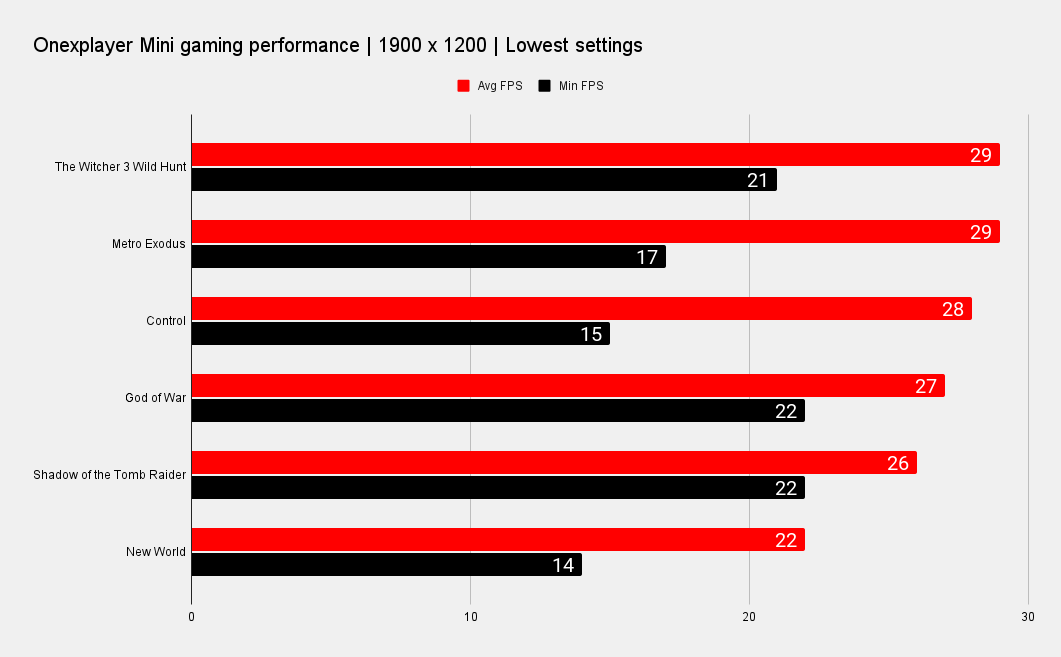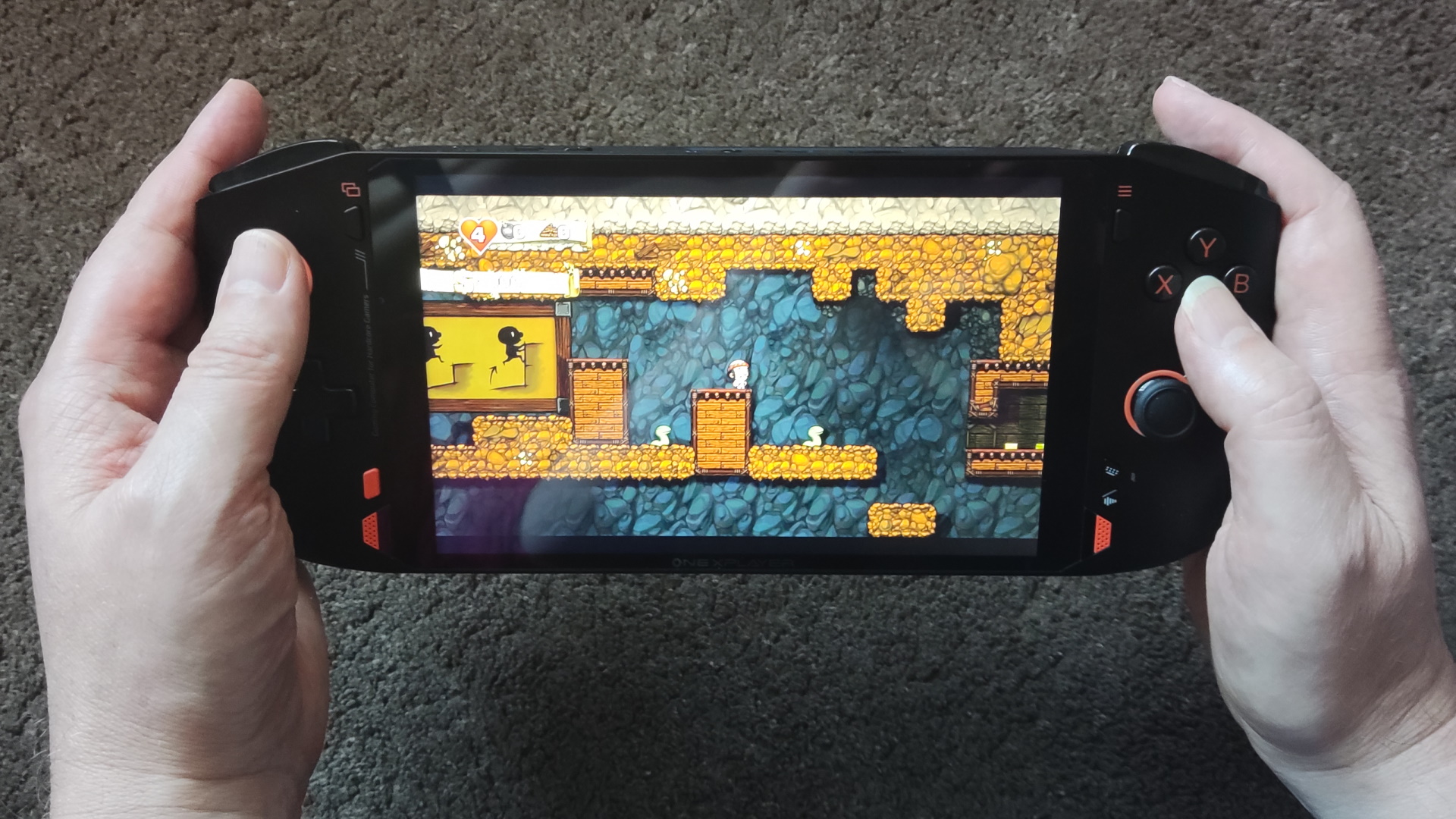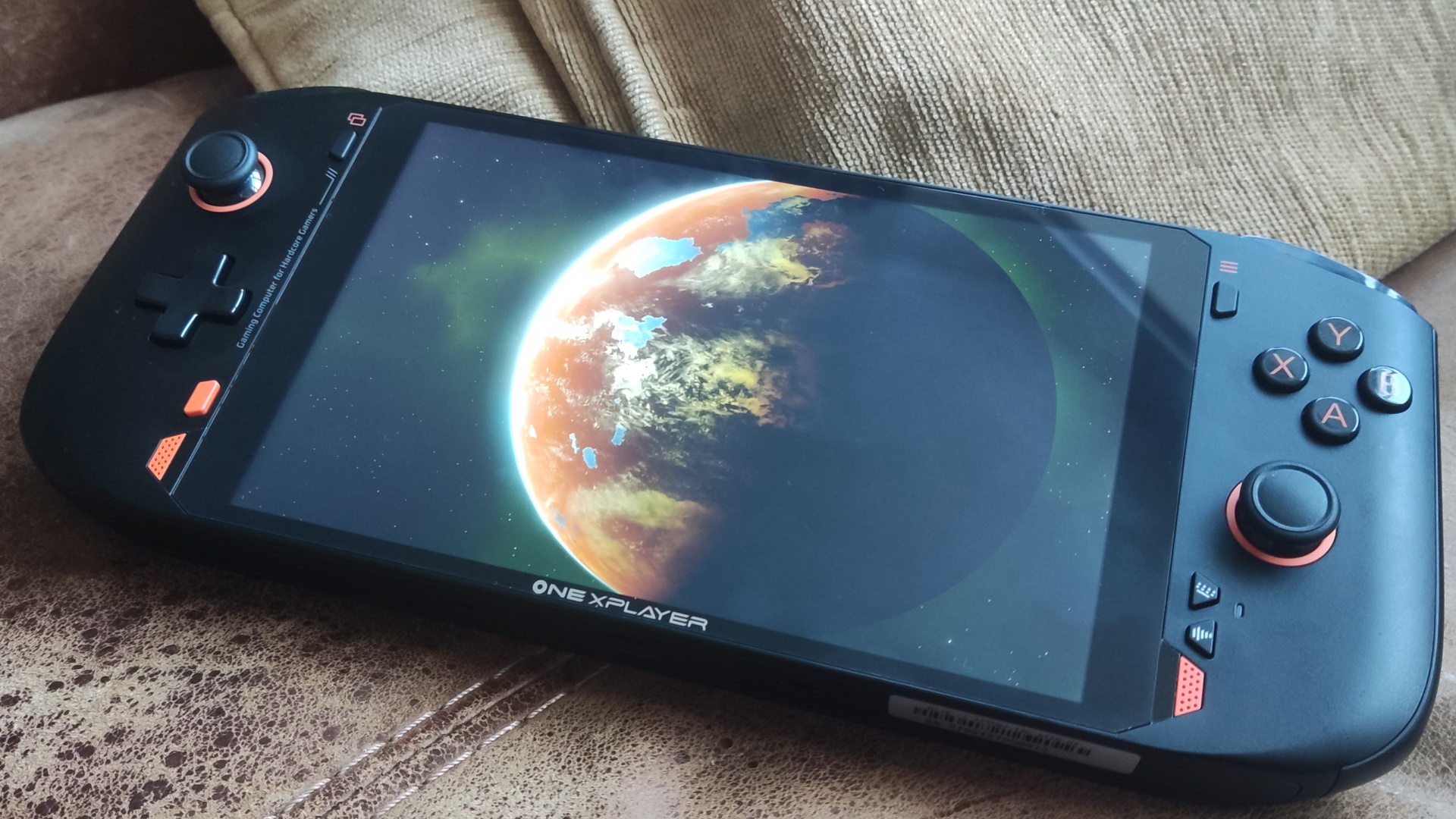Our Verdict
This pricey handheld feels great to hold but it's unquestionably a niche product, and the lack of graphics oomph is ultimately its undoing.
For
- Excellent build quality
- Versatile and easily portable
- Familiar Windows OS
Against
- Integrated graphics lack power
- Some games simply don't run
- Can be frustratingly fiddly to use
PC Gamer's got your back
The Onexplayer Mini is the latest handheld PC release that isn't Valve's Steam Deck. It doesn't have the Steam Deck's modest screen res of 1280 x 800, preferring to go for a seemingly more impressive 1920 x 1200. Nor does it have the tempting price tag of Valve's handheld—the cheapest Onexplayer Mini will set you back $1,259, a sight more than the $399 of the cheapest Steam Deck. What you do get here though is Windows 11 installed as standard, a beefy Intel 11th Gen Core i7 processor, and a 512GB SSD.
The original 8.4-inch Onexplayer (now called the 1S) was released back in May 2021 and used a slighter weaker processor but otherwise had similar specs to this machine, but was in a larger, bulkier unit. This new 7-inch version is still bulky, about twice as thick as the Nintendo Switch, although it does feel a bit more manageable in hand and is comfortable to hold for longer periods. The buttons, triggers, and analogue joysticks feel good, and overall it gives a good impression of a quality handheld.
Of course, it's on the gaming front where the fate of this machine will be decided, and here the wheels start to come off a bit. Despite the jaw-dropping price tag, we're in integrated graphics country here, and that means not all games are going to work flawlessly. In fact, plenty won't work at all, and those that do are going to be held back by the Iris Xe silicon squeezed into Intel's Core i7 1195G7.
You're looking at 96 Execution Units with a max graphics clock of 1.4GHz, which is weedy in comparison to even the cheapest of discrete graphics cards. This means you can expel any notion of running the very latest games at the highest settings, and even that native resolution can be a bit of a headache. Often getting the most out of the Onexplayer Mini is a bit of a balancing act between resolution and settings—something that is undoubtedly going to be the same with the Valve Steam Deck as well.
CPU: Intel Core i7 1195G7
GPU: Intel Iris Xe (96 EU)
RAM: 16GB DDR4-4266
Storage: 512GB PCIe 4.0 SSD
Display: 7-inch IPS, 323PPI
Resolution: 1920 x 1200
Connectivity: 2x USB 3.2 Gen 2 Type-C, USB 3.0 Type-A, 3.5mm audio
Battery: 40.25Wh
Wireless: Wi-Fi 6, Bluetooth 5
Size: 10.23 x 4.1 x 0.9 inches
Weight: 587g
OS: Windows 11
Price: $1,259
Taking Metro Exodus as an example, it can run surprisingly well on the device. Not perfect, but 30fps at the native resolution of 1920 x 1200 using the Low presets isn't a bad starting point. Dropping the resolution down to 1280 x 720 and upping the settings to Medium produced a similar frame rate, although the game wouldn't run in full-screen mode and instead lives as window in the top-left corner of the screen, so that's not really an option.
It shouldn't surprise you too much to learn that running it at our normal Ultra settings at 1080p for comparison to other machines resulted in a thoroughly miserable experience at 10fps. Don't do that to yourself.

Unfortunately, the list of games that failed grew the more we used it. Cyberpunk 2077 was never going to be an easy test for this handheld, but it wouldn't even load. Horizon Zero Dawn meanwhile would load, but then crash the moment you tried playing it. The more recently released God of War did run, but only saw 128MB of VRAM, and so looked absolutely awful. To be fair this is a problem with the game, and it's something that affected the AMD Ryzen 5700G before hard setting the VRAM amount in the BIOS—not something that's possible here, unfortunately.
Less demanding games make it a joy to use rather than a hardware battle to be won.
You're in for a better time with older games. The Witcher 3, for instance, ran well at the native resolution using the low settings, averaging out at 29fps and still looking pretty impressive some seven years after release. It still stuttered at times, though, so it isn't a screaming success. Shadow of the Tomb Raider and Control both managed almost-playable framerates, at under 30fps. I mean you could play them on this machine, but you know you're not going to be getting perfection.
Less demanding games, like Spellunky, Limbo, Dirt Showdown, and Hearthstone made for much better experiences. Games that make it a joy to use rather than a hardware battle to be won. If you've got a back catalogue that you've been meaning to get around to, then a handheld (either this or the Steam Deck) offer a decent way of clearing it. If you're intending to use it as your main gaming machine though, you're in for a frustrating time.

Having used the Onexplayer Mini for a little while now, it highlights a couple of things about this handheld specifically, but also the market in general. The first is that Windows performs an important role in how versatile this handheld is—apps that you know and love just run on it. Got an old emulator you want to try out? It'll take you seconds to see how it fares. Nvidia Frameview? No worries. GoG Galaxy, Epic Games, you name it, they all just work straight out of the box.
Sure the Steam Deck will allow you to install Windows on it, but it's not the same as it just running it straight out of the box, and we've yet to see how tricky getting Windows on it is going to be. This extends to simply being able to plug in keyboards and mice as well, although hopefully, things will be just as straightforward with SteamOS 3.0. For pure gaming, you may not think such things matter, but it's surprising how often I needed to plug a peripheral or device in.
Windows isn't without its frustrations mind, and there were plenty of times where I needed to reach for a keyboard or mouse to just make my way through a settings screen. The software keyboard can be difficult to use at this resolution, and it's all too easy to enter a password or code incorrectly. Clicking on items can also be very frustrating, with plenty of misclicks and unintended dragging. Windows is both one of the machine's high points and frustrations, which is pretty unsurprising really.

The main problem though is the inherent lack of power of integrated graphics. There's no question that they've got a lot better recently and plenty of games will at least now run, but it's rarely a pretty sight. You're still going to struggle with more recent releases too, and you can expect problems in the more demanding games too, not just with framerates. Navigating some of these interfaces can be extremely frustrating and even offering a wider gamut of resolutions would be welcome. The Steam Deck should help here, with the might of Valve encouraging developers to at least make things easier to get running.
Now for the thousand dollar question: should you buy the Onexplayer Mini? For the vast majority of PC gamers, the answer is probably not. It's too limited, too fiddly, and now looks far too expensive. Like its predecessor, this feels like a niche product. A gaming laptop for this sort of cash will just be a better machine to game on. Valve's imminent steamrolling of the PC handheld market doesn't help the Onexplayer one bit either, making it an ultra-expensive option offering, if anything, worse performance.
This pricey handheld feels great to hold but it's unquestionably a niche product, and the lack of graphics oomph is ultimately its undoing.
Alan has been writing about PC tech since before 3D graphics cards existed, and still vividly recalls having to fight with MS-DOS just to get games to load. He fondly remembers the killer combo of a Matrox Millenium and 3dfx Voodoo, and seeing Lara Croft in 3D for the first time. He's very glad hardware has advanced as much as it has though, and is particularly happy when putting the latest M.2 NVMe SSDs, AMD processors, and laptops through their paces. He has a long-lasting Magic: The Gathering obsession but limits this to MTG Arena these days.



